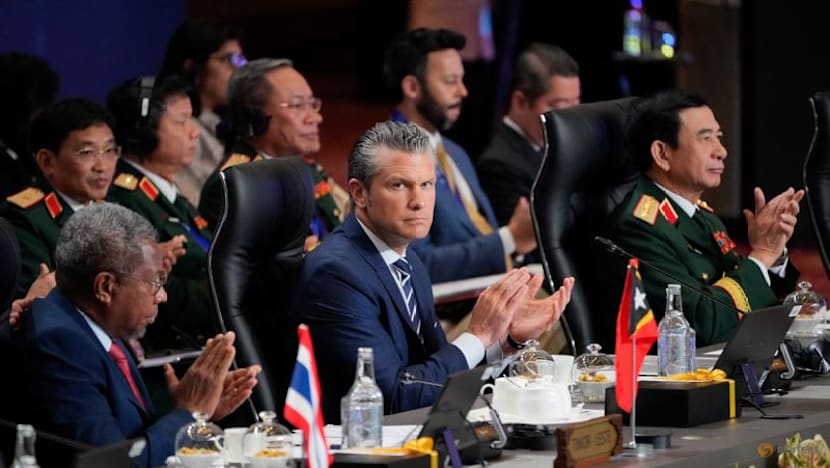The Association of Southeast Asian Nations (ASEAN) reaffirmed its unity and commitment to strengthening regional defence cooperation at its recently concluded defence ministers’ meeting in Kuala Lumpur.
In a joint statement, the regional bloc underscored the importance of upholding international law and promoting stability through collaboration.
The meeting also welcomed defence chiefs from major powers including the United States, China and India, reflecting the growing global interest in security in the region.
DEFENCE COLLABORATION
Delegates explored new areas of cooperation, including cyber defence, artificial intelligence and disaster response.
One of the most closely watched topics was the Sout…
The Association of Southeast Asian Nations (ASEAN) reaffirmed its unity and commitment to strengthening regional defence cooperation at its recently concluded defence ministers’ meeting in Kuala Lumpur.
In a joint statement, the regional bloc underscored the importance of upholding international law and promoting stability through collaboration.
The meeting also welcomed defence chiefs from major powers including the United States, China and India, reflecting the growing global interest in security in the region.
DEFENCE COLLABORATION
Delegates explored new areas of cooperation, including cyber defence, artificial intelligence and disaster response.
One of the most closely watched topics was the South China Sea, where overlapping territorial claims have long posed a flashpoint for tensions.
Defence leaders renewed hopes for finalising a long-discussed code of conduct to govern activities in the disputed waters.
The Philippines, which has succeeded the ASEAN chairmanship from Malaysia, said it would make the framework a top priority during its tenure.
PHILIPPINE-US TIES
On the sidelines of the meeting, Manila and Washington announced the formation of a new military task force aimed at strengthening cooperation and boosting military readiness, particularly in the South China Sea.
China claims vast areas of the South China Sea, overlapping with territories claimed by four Southeast Asian nations – Malaysia, Brunei, the Philippines and Vietnam.
Philippine and Chinese vessels have had frequent confrontations in the disputed waters, particularly around the Spratly Islands.
Philippine Defence Secretary Gilbert Teodoro told CNA that respect for global norms must not depend on size or influence, emphasising adherence to international maritime law.
“This should not be bipolar balanced power. It should be exercised, but by all countries, whether big or small – with agency,” he said.
“There are great powers in the world. (But) they need to work under an agreed, clear and transparent set of rules and norms.”
MILITARY BUDGETS
Teodoro stated that the Philippines intends to boost its defence spending, although this will be implemented gradually due to fiscal constraints.
“We have to devote more resources to defence spending. My personal goal is to use New Zealand … as a model. It is more digestible for our economy,” he said. Wellington plans to double its military budget over the next eight years to 2 per cent of its gross domestic product (GDP).
Data from the World Bank Group showed the Philippines’ defence expenditure was 1.2 per cent of its GDP in 2023. Analysts have noted that this remains a relatively modest budget for a nation with strategic vulnerabilities.

Meanwhile, Malaysia’s Defence Minister Mohamed Khaled Nordin said he was “satisfied” with his nation’s current military budget – which continues to grow annually.
“(Comparing) the amount of allocation that the Ministry of Defence in Malaysia obtains to other ministries, we are not too bad. We are number four … and every year there is an increase,” he said. “We believe that whatever that we procure (for defence spending) is more of a deterrent.”
Malaysia’s defence allocation will rise to US$5 billion in 2026, a 2.9 per cent increase from this year, as part of efforts to modernise its armed forces.
STRENGTHENING ASEAN SOLIDARITY
Khaled said ASEAN has come a long way in fostering peace across the region.
The bloc has deployed an observer team to monitor the ceasefire along the Thai-Cambodia border, following the signing of a joint peace declaration at the ASEAN summit.
Malaysia also inked a defence cooperation agreement with Timor-Leste to support the development of the military capabilities of ASEAN’s newest member and facilitate its participation in regional exercises.
Khaled stressed the regional bloc must work together to overcome external challenges and maintain collective strength.
“There are many challenges that ASEAN faces from the outside. There are efforts to try and woo ASEAN countries to take sides,” he said.
“But if ASEAN can work as a team, there will be respect for ASEAN. With that, we will be able to secure peace, stability and security.”
While ASEAN leaders continue to push for greater self-reliance in defence, analysts note that the bloc’s strength lies in forging partnerships and maintaining balance between major powers.
“Most (ASEAN) countries do not have the defensive ability to match the major powers,” said Adib Zalkapli, the managing director of Viewfinder Global Affairs, a Malaysia-based global affairs consulting firm.
“So, alliance partnership is necessary (as) some kind of security guarantee or not losing autonomy,” he told CNA938.
“The best option is to balance … cooperation with the US but at the same time weigh the possibilities of enhancing cooperation with other major powers.”